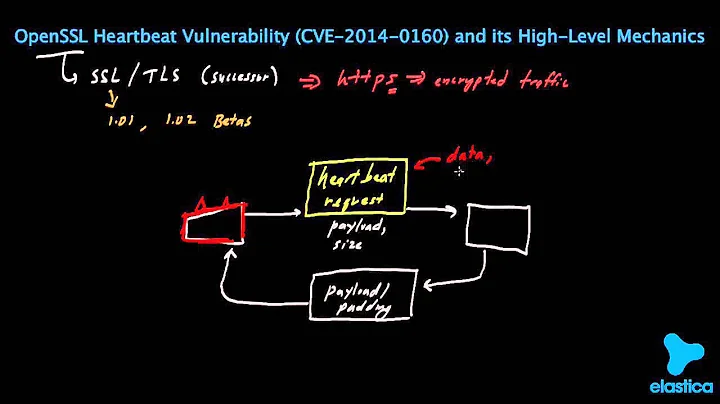Heartbleed: What is it and what are options to mitigate it?
Solution 1
First, before freaking out, be sure that you understand whether or not this vulnerability actually applies to you. If you have a server, but have never actually had any applications using TLS, then this is not a high-priority thing for you to fix. If, on the other hand, you have ever had TLS-enabled applications, well then you're in for a treat. Read on:
What exactly is CVE-2014-0160 aka "Heartbleed"?
It's a big fricking mess, that's what it is. In short, a remotely-exploitable vulnerability was discovered in OpenSSL versions 1.0.1 through 1.0.1f through which an attacker can read certain parts of system memory. Those parts being that which hold sensitive data such as private keys, preshared keys, passwords and high valued corporate data among other things.
The bug was independently discovered by Neel Mehta of Google Security (March 21, 2014) and Finnish IT security testing firm Codenomicon (April 2, 2014).
What is the cause?
Well, errant code in OpenSSL. Here is the commit that introduced the vulnerability, and here is the commit that fixed the vulnerability. The bug showed up in December of 2011 and was patched today, April 7th, 2014.
The bug can also be seen as a symptom of a larger problem. The two related problems are (1) what process are in place to ensure errant code is not introduced to a code base, and (2) why are the protocols and extensions so complex and hard to test. Item (1) is a governance and process issue with OpenSSL and many other projects. Many developers simply resist practices such as code reviews, analysis and scanning. Item (2) is being discussed on the IETF's TLS WG. See Heartbleed / protocol complexity.
Was the errant code maliciously inserted?
I won't speculate on whether this was truly a mistake or possibly a bit of code slipped in on behalf of a bad actor. However, the person who developed the code for OpenSSL states it was inadvertent. See Man who introduced serious 'Heartbleed' security flaw denies he inserted it deliberately.
What OSs and versions of OpenSSL are vulnerable?
As mentioned above, any operating system that is using, or application that is linked against OpenSSL 1.0.1 through 1.0.1f.
What are the symptoms, are any methods to detect a successful exploit?
This is the scary part. As far as we know, there is no known way to detect whether or not this vulnerability has been exploited. It is theoretically possible that IDS signatures will be released soon that can detect this exploit, but as of this writing, those are not available.
There is evidence that Heartbleed was being actively exploited in the wild as early as November, 2013. See the EFF's Wild at Heart: Were Intelligence Agencies Using Heartbleed in November 2013? And Bloomberg reports the NSA had weaponized the exploit shortly after the vulnerability was introduced. See NSA Said to Exploit Heartbleed Bug for Intelligence for Years. However, the US Intelligence Community denies Bloomberg's claims. See IC ON THE RECORD.
How can I check to see if my system is affected?
If you are maintaining OpenSSL on your system, then you can simply issue openssl version:
$ openssl version
OpenSSL 1.0.1g 7 Apr 2014
If the distribution is maintaining OpenSSL, then you probably can't determine the version of OpenSSL due to back patching using openssl command or the package information (for example, apt-get, dpkg, yum or rpm). The back patching process used by most (all?) distributions only uses the base version number (for example, "1.0.1e"); and does not include an effective security version (for example, "1.0.1g").
There's an open question on Super User to determine the effective security version for OpenSSL and other packages when packages are backpatched. Unfortunately, there are no useful answers (other than check the distro's website). See Determine Effective Security Version when faced with Backpatching?.
As a rule of thumb: if you have ever installed one of the affected versions, and have ever run programs or services that linked against OpenSSL for TLS support, then you are vulnerable.
Where can I find a program to test for the vulnerability?
Within hours of the Heartbleed announcement, several people on the internet had publicized publicly-accessible web applications that supposedly could be used to check a server for the presence of this vulnerability. As of this writing, I have not reviewed any, so I won't further publicize their applications. They can be found relatively easily with the help of your preferred search engine.
How is this vulnerability mitigated?
Upgrade to a non-vulnerable version and reset or re-secure vulnerable data. As noted on the Heartbleed site, appropriate response steps are broadly:
- Patch vulnerable systems.
- Regenerate new private keys.
- Submit new CSR to your CA.
- Obtain and install new signed certificate.
- Invalidate session keys and cookies
- Reset passwords and shared secrets
- Revoke old certificates.
For a more detailed analysis and answer, see What should a website operator do about the Heartbleed OpenSSL exploit? on the Security Stack Exchange.
Should I be concerned that my keys or other private data have been compromised? What other side effects should I be concerned about?
Absolutely. Systems Administrators need to assume that their servers which used vulnerable OpenSSL versions are indeed compromised and respond accordingly.
Shortly after the vulnerability was disclosed, Cloudfare offered a challenge to see if a server's private key could be recovered in practice. The challenge was independently won by Fedor Indutny and Ilkka Mattila. See The Heartbleed Challenge.
Where can I find more information?
Link dump, for those looking for more details:
- OpenSSL SECADV 2014047
- CVE-2014-0160
- Heartbleed
- Ubuntu announcement
- RHEL announcement
- Official OpenSSL announcement
A rather detailed timeline of the disclosure events can be found at Heartbleed disclosure timeline: who knew what and when.
If you are a programmer and are interested in various programming tricks like detecting a Heartbleed attack through OpenSSL's msg_cb callback, then see OpenSSL's Security Advisory 2014047.
Solution 2
A simple explanation of the bug, by XKCD:
Solution 3
Ubuntu 12.04, 12.10, and 13.10
Ubuntu has issued USN-2165-1, which states that updated packages are now available in the archives. Run the following two commands to grab the fix.
sudo apt-get update
sudo apt-get upgrade
Ubuntu 14.04
I have uploaded a Debian package containing the new release (1.0.1g) to a PPA I have set up for this purpose. These three commands will add my PPA to your system, update the list of available packages, and upgrade everything:
sudo add-apt-repository ppa:george-edison55/openssl-heartbleed-fix
sudo apt-get update
sudo apt-get upgrade
Note: the PPA also provides packages for Ubuntu 12.04 and 13.10, just in case you prefer to actually run the new version (1.0.1g) instead of just using the patched versions in the archives.
Ubuntu 10.04
This is an LTS Version, the server version is still supported and receives security updates. But the heartbleed vulnerability did not affect the openssl package of a standard installation of ubuntu 10.04, because the version is below 1.0.1.
The desktop version has reached end of life and needs to be upgraded / reinstalled.
Ubuntu 13.04 and other outdated versions
Ubuntu 13.04 had a very short support cycle which you might not expect. It has reached end of life already and does not receive security updates any more. It should long have been upgraded. If still someone is using it, please upgrade now, either from scratch or it can be upgraded non-destructive to 13.10 following this easy procedure: http://www.tecmint.com/upgrade-ubuntu-13-04-raring-ringtail-to-ubuntu-13-10-saucy-salamander/ After the upgrade the system receives the heartbleed patch from 13.10.
For all other outdated ubuntu versions it means basically a fresh install is necessary.
Verify that the patch was applied
Essentially, run openssl version -a and make sure that the build date is April 7, 2014 or later, but see more here.
Reboot
The best way to make sure all services depending on OpenSSL are restarted is to reboot.
Solution 4
RedHat 6.5 and CentOS 6.5
These are vulnerable. RedHat's erratum RHSA-2014-0376 says there are patched libraries available, and anyone affected should upgrade at the earliest opportunity.
At the time of writing, CentOS did not yet have a fixed version, but Karanbir Singh's posting to CentOS-announce says that they've produced an updated version of openssl (openssl-1.0.1e-16.el6_5.4.0.1, note the last four digits which are important) that has the exploitable TLS command disabled, and that can be safely applied as it will be overwritten by a fixed version when it is eventually released.
The temporarily-fixed version doesn't seem to have made it onto all the mirrors yet, but is in the main repository at http://mirror.centos.org/centos/6/updates/x86_64/Packages/ (and similarly for i686).
Edit: as Iain says, there does now appear to be a fully-patched version for C6.5, and it seems to have been pushed around the mirrors in a hurry. A straight yum update got it for my servers; it's openssl-1.0.1e-16.el6_5.7.
Versions of RH6 and C6 prior to 6.5
These are not vulnerable. According to this advisory from Red Hat,
This issue did not affect the versions of openssl as shipped with Red Hat Enterprise Linux 5 and Red Hat Enterprise Linux 6.4 and earlier.
Karanbir Singh's posting to CentOS-announce is equally clear about versioning:
Earlier in the day today, we were made aware of a serious issue in openssl as shipped in CentOS-6.5
Solution 5
Debian Wheezy
Debian has issed DSA-2896-1 and patched libraries are available here. A shell script is available here.
1. Patch
Apt-get repository was updated so now patched libraries are available via apt-get update && apt-get upgrade
apt-get upgrade libssl1.0.0 openssl
Alternatively (not recommended) the packages can be upgraded manually:
wget http://security.debian.org/pool/updates/main/o/openssl/libssl1.0.0-dbg_1.0.1e-2+deb7u5_amd64.deb
wget http://security.debian.org/pool/updates/main/o/openssl/openssl_1.0.1e-2+deb7u5_amd64.deb
wget http://security.debian.org/pool/updates/main/o/openssl/libssl1.0.0_1.0.1e-2+deb7u5_amd64.deb
wget http://security.debian.org/pool/updates/main/o/openssl/libssl-dev_1.0.1e-2+deb7u5_amd64.deb
dpkg -i openssl_1.0.1e-2+deb7u5_amd64.deb
dpkg -i libssl1.0.0_1.0.1e-2+deb7u5_amd64.deb
dpkg -i libssl1.0.0-dbg_1.0.1e-2+deb7u5_amd64.deb
dpkg -i libssl-dev_1.0.1e-2+deb7u5_amd64.deb
2. Restart server/services
For best protection restart the entire server or if server can't be offline then restart needed services.
3. Check OpenSSL Version
love@server:~$ openssl version
OpenSSL 1.0.1e 11 Feb 2013
love@server:~$ dpkg -l libssl1.0.0
||/ Name Version Architecture Description
+++-=======================-================-================-====================================================
ii libssl1.0.0 1.0.1e-2+deb7u6 amd64 SSL shared libraries
Related videos on Youtube
Snowlockk
I work for Digital Ocean as an Customer Success Engineer. When I'm not at work you can often find learning Python and Ruby, managing my home "network", and cycling.
Updated on September 18, 2022Comments
-
Snowlockk over 1 year
This is a Canonical Question about understanding and remediating the Heartbleed security issue.
What exactly is CVE-2014-0160 AKA "Heartbleed"? What is the cause, what OSs and versions of OpenSSL are vulnerable, what are the symptoms, are there any methods to detect a successful exploit?
How can I check to see if my system is affected? How can this vulnerability be mitigated? Should I be concerned that my keys or other private data have been compromised? What other side effects should I be concerned about?
-
scuzzy-delta about 10 yearsMitigation for Heartbleed involves more than just new keys. (Link to my answer on Information Security StackExchange)
-
MadHatter about 10 yearsI hear you, but I think EEAA pretty comprehensively covered that below.
-
scuzzy-delta about 10 yearsI agree: it's a great answer, but heartbleed.com goes to great effort to point out that there are considerations beyond just new key pairs - like forcing password changes and session invalidation.
-
Kevin about 10 yearsI wrote a CentOS Patch tutorial here: kevinflorida.com/heartbleed-patch
-
 Admin about 10 years"I have looked at the OpenSSL source code, I think it is a catastrophe waiting to happen." said phk varnish-cache.org/lists/pipermail/varnish-misc/2010-April/…
Admin about 10 years"I have looked at the OpenSSL source code, I think it is a catastrophe waiting to happen." said phk varnish-cache.org/lists/pipermail/varnish-misc/2010-April/… -
Snowlockk about 10 yearsThanks to everyone for upvoting the question, but please upvote the answers too!
-
Wayne Werner about 10 yearsBest example on what it is - (unsurprisingly) XKCD: xkcd.com/1354
-
molnarm about 10 years@EricDANNIELOU Wow, the signature in the message you linked is very much relevant here: "Never attribute to malice what can adequately be explained by incompetence."
-
-
voretaq7 about 10 years+1 for SHUT. DOWN. YOUR. SERVERS.* -- If you do ANYTHING where SSL is really important, shut it off until you fix the issue. Also don't forget to install new certificates (with new keys) after you patch your servers - reusing your old keys (which may have been compromised) defeats the whole purpose of patching the vulnerability...
-
 EEAA about 10 yearsALSO - restart any services that link to OpenSSL libraries. Upgrading OpenSSL without restarting your daemons is as good as not upgrading at all.
EEAA about 10 yearsALSO - restart any services that link to OpenSSL libraries. Upgrading OpenSSL without restarting your daemons is as good as not upgrading at all. -
voretaq7 about 10 yearsIndeed - after any kind of major patch (like OpenSSL) I consider it a good rule to just reboot the machine to make sure you don't miss anything.
-
Bhavi about 10 yearsI can't speak for other versions, but there appears to be a patch available for precise (12.04). While I can't say for certain that this fixes the vulnerability, it was at least compiled after the relevant commit (
Mon Apr 7 20:31:55 UTC 2014). -
Nathan Osman about 10 years@Calrion: A patch for OpenSSL or the Debian packaging for OpenSSL? OpenSSL has already been fixed and a new release issued.
-
pdeva about 10 yearswhat will happen to existing connections while openssl is being updated? will they be dropped?
-
Nathan Osman about 10 yearsThat depends on which web server you are using and how you update. That being said, I wouldn't worry about dropping existing connections since they are using the vulnerable version.
-
Riking about 10 yearsOne of the testers has been open-sourced: github.com/FiloSottile/Heartbleed
-
Lekensteyn about 10 years@EEAA Good point on restarting the services. For those who cannot reboot immediately, the following command can find processes that need closer attention:
ps uwwp $(find /proc -maxdepth 2 -name maps -exec grep -HE '/libssl\.so.* \(deleted\)' {} \; | cut -d/ -f3 | sort -u) -
user9517 about 10 yearsIsn't lists.centos.org/pipermail/centos-announce/2014-April/… the release of the fix ?
-
 user about 10 yearsIf you're getting updates from
user about 10 yearsIf you're getting updates fromwheezy/securitythen you'll be good withapt-get update && apt-get upgrade. Or, use an interactive package manager to only update the packagesopenssl,libssl1.0.0,libssl1.0.0-dbgandlibssl-dev(as installed on your system). -
user568829 about 10 yearsusing apt-get does not fix the problem for me - still showing OpenSSL 1.0.1e 11 Feb 2013
-
moxy about 10 years14.04 has since received a patch.
-
that guy from over there about 10 years
-
Snowlockk about 10 yearsI just got an email from Snapt, theirs it. BOLO (Be on the lookout) !
-
 Eduard Florinescu about 10 yearsWhy is the private key in plain in the memory ?
Eduard Florinescu about 10 yearsWhy is the private key in plain in the memory ? -
Bhavi about 10 years@NathanOsman The
opensslpackage available for precise has been updated. I applied the updated package to my server and SSL Labs reports that my server is not vulnerable to heartbleed. I simply ransudo apt-get update && sudo apt-get upgrade. -
Simon Lindgren about 10 yearsDoing this is not enough. See the Community Wiki answer by @EEAA.
-
 Nathan C about 10 years@EduardFlorinescu The web server needs to use the private key to decrypt SSL traffic, so it sits in RAM. It's pure luck to get anything useful (like the keys) with this exploit, though.
Nathan C about 10 years@EduardFlorinescu The web server needs to use the private key to decrypt SSL traffic, so it sits in RAM. It's pure luck to get anything useful (like the keys) with this exploit, though. -
 Eduard Florinescu about 10 yearsDon't Shut down your servers. Disconnect those cables. «Disconnect these cables. Overturn these tables. This place don't make sense to me no more. Can you tell me what we're waiting for, señor? » - Bob Dylan
Eduard Florinescu about 10 yearsDon't Shut down your servers. Disconnect those cables. «Disconnect these cables. Overturn these tables. This place don't make sense to me no more. Can you tell me what we're waiting for, señor? » - Bob Dylan -
 EEAA about 10 years@EduardFlorinescu - for physical servers in one's one data center, sure. For rented VPSs/dedicated servers/etc, not possible.
EEAA about 10 years@EduardFlorinescu - for physical servers in one's one data center, sure. For rented VPSs/dedicated servers/etc, not possible. -
 Eduard Florinescu about 10 years@EEAA make me think that if you cannot touch the cable the data is not really yours.
Eduard Florinescu about 10 years@EEAA make me think that if you cannot touch the cable the data is not really yours. -
Simon Lindgren about 10 years@EduardFlorinescu How else would you use it?
-
jacksoncage about 10 yearsThanks @michael-kjorling, it was not available when I did this, but it's most secure and correct way of upgrading.
-
jacksoncage about 10 years@user568829 after applying the patch openssl version will still show
OpenSSL 1.0.1e 11 Feb 2013as the patch is called 1.0.1e-2. You can check withdpkg -l openssland it should show version1.0.1e-2+deb7u6 -
 user about 10 yearsI'd suggest restarting the host after updating OpenSSL, not because it is strictly necessary but for peace of mind that at least everything that loads the OpenSSL libraries dynamically is using the new version. (Statically linked is another matter.) That said, I recognize that some servers can't easily be rebooted in all situations where a service restart might be acceptable.
user about 10 yearsI'd suggest restarting the host after updating OpenSSL, not because it is strictly necessary but for peace of mind that at least everything that loads the OpenSSL libraries dynamically is using the new version. (Statically linked is another matter.) That said, I recognize that some servers can't easily be rebooted in all situations where a service restart might be acceptable. -
 EEAA about 10 years@EduardFlorinescu - you're just trolling now. There are plenty of situations, even with a company's own servers, where the sysadmin team doesn't have physical access to the datacenter.
EEAA about 10 years@EduardFlorinescu - you're just trolling now. There are plenty of situations, even with a company's own servers, where the sysadmin team doesn't have physical access to the datacenter. -
psusi about 10 years@EEAA, "shutdown your servers" does not mean you have to pull the power. It means shut down ( or reconfigure to disable ssl/tls ) apache, or whatever service is doing the serving.
-
 EEAA about 10 years@psusi If someone doesn't know whether or not they're vulnerable or whether or not they will be able to easily fix the vulnerability, the most foolproof thing to do is shut down.
EEAA about 10 years@psusi If someone doesn't know whether or not they're vulnerable or whether or not they will be able to easily fix the vulnerability, the most foolproof thing to do is shut down. -
 Christopher H about 10 years"I won't speculate on whether this was truly a mistake or possibly a bit of code slipped in on behalf of a bad actor." - the code was provided by Robin Seggelmann. Seggelmann was coauthor of Transport Layer Security (TLS) and Datagram Transport Layer Security (DTLS) Heartbeat Extension RFC. The actual commit was done by Dr. Henson; see the 4817504d0 commit. The IETF's TLS WG is debating the usefulness and added complexity of such extensions now at TLS: Heartbleed / protocol complexity.
Christopher H about 10 years"I won't speculate on whether this was truly a mistake or possibly a bit of code slipped in on behalf of a bad actor." - the code was provided by Robin Seggelmann. Seggelmann was coauthor of Transport Layer Security (TLS) and Datagram Transport Layer Security (DTLS) Heartbeat Extension RFC. The actual commit was done by Dr. Henson; see the 4817504d0 commit. The IETF's TLS WG is debating the usefulness and added complexity of such extensions now at TLS: Heartbleed / protocol complexity. -
 EEAA about 10 years@noloader - it's a CW. Feel free to edit as you wish. Like I said, in my answer I wasn't going to comment on this - that wasn't the purpose of the answer.
EEAA about 10 years@noloader - it's a CW. Feel free to edit as you wish. Like I said, in my answer I wasn't going to comment on this - that wasn't the purpose of the answer. -
psusi about 10 years@EEAA, it is also the least desirable response and, as you pointed out, not always possible.
-
psusi about 10 years@EEAA, I was responding to your comment that you can't always shutdown.
-
 Haris Hasan about 10 yearscan you respond to this question askubuntu.com/questions/445821/…
Haris Hasan about 10 yearscan you respond to this question askubuntu.com/questions/445821/…





